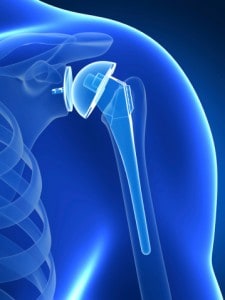Shoulder Implant Recalled Over High Risk of Fracture

The recall affects Zimmer Biomet’s Comprehensive Reverse Shoulder System Humeral Tray Model 115430, commonly referred to as the Biomet Comprehensive Reverse Shoulder Humeral. Models manufactured after 2008 and implanted before 2015 are at a higher-than-reported risk of fracturing at the socket, a failure that requires invasive surgery to repair.
What is a reverse shoulder implant?
The reverse implant is used for patients with significant rotator cuff damage, or with a type of shoulder arthritis called “cuff tear arthropathy.” These patients would have only limited function from a typical shoulder replacement, whereas a reverse shoulder system allows different muscles to be used to control the arm. Arthropathy patients can regain a significant amount of function and control with a reverse shoulder implant.
From the American Academy of Orthopedic Surgeons: “A conventional shoulder replacement device mimics the normal anatomy of the shoulder: a plastic ‘cup’ is fitted into the shoulder socket (glenoid), and a metal ‘ball’ is attached to the top of the upper arm bone (humerus). In a reverse total shoulder replacement, the socket and metal ball are switched. The metal ball is fixed to the socket and the plastic cup is fixed to the upper end of the humerus.”
In Zimmer’s implant, the metal plate that affixes the plastic cup to the humerus can fracture. Small pieces of metal can dislodge and cause muscle tears, increasing the risk of infection. In addition, the shoulder essentially becomes separated and dislocated, causing a significant amount of pain that requires surgery to repair. Worse, because the system requires extensive modification to the bones and musculature, any revision surgery can result in significant loss of function.
If you or your loved one received a Zimmer Biomet implant after 2008, you may be a victim of a defective medical device. Revision surgeries and the loss of limb function are no small matter; talk to the experienced South Carolina defective medical device lawyers at McGowan, Hood, Felder & Phillips today. Call 803-327-7800 or contact us today for a free consultation.
Related:
- How to Decide Whether to File a Defective Medical Device Lawsuit
- How to Determine Whether You Have a Defective Medical Device

Randy is the former President of the South Carolina Association for Justice. He has been certified by the American Board of Professional Liability as a specialist in Medical Malpractice Law which is recognized by the South Carolina Bar. Randy has also been awarded the distinction of being a “Super Lawyer” 10 times in the last decade. He has over 25 years of experience helping injured people fight back against corporations, hospitals and wrong-doers.
Read more about S. Randall Hood

